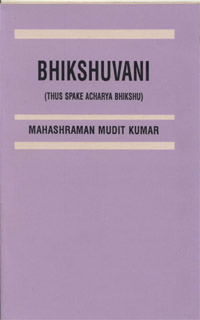पुण्य
Virtue (Punya)
६३. पुन्या सहजे हुवे निरजरा कीयां, ज्यूं खाखलो हुवे गोहां रे साथ I
Dissociation of Karmas collocates with punya as naturally as husk with wheat grain.
६४. ज्यां लग पुन्न छे जिण जीव रे, गमतो लागे छे सगला ने तांय I
पुन्न परवार्यां इण जीव रे, बाहला ते बेरी होय जाय II
A man endears himself to everyone when his punya is in the ascendancy. When punya declines even the dear ones-become enemies.
६५. पुन्न तणा सुख रोगला, खाज रोग तणे दिष्टंत I
Happiness resulting from the ascendancy of punya is like an itch. It is pleasant in the beginning but not so later.
६६. हलूकरमीं मातपिता हुवें ताहि, तिणरें उत्तम जीव उपजें गर्भ मांहि I
सरीर मांहे रहें सुख समाध, दुख दलदर दूर टलें असमाध II
Virtuous parents, give birth to a refined being. The body enjoys contemplative bliss. Sorrow, indigence and non-contemplative state disappear.
पुण्य-पाप
Virtue-Vice (Punya and Pap)
६७. साथ आवे पुन्य नें पाप, सुख-दुख भोगवे आपोआप I
Earned virtue and vice go together. They automatically generate happiness and unhappiness respectively.
पुरुषार्थ
Human Effort
६८.निर्फल रुंखज होय, निर्फल होय जावे अस्त्री I
सुणज्यो भवियण लोय, पिण करणी कदे निर्फल नहीं II
A tree may be fruitless; a woman may be barren. But one's own actions, good or bad, can never be fruitless.
बुध्दि
Intellect
६९.बुध्दि तिणां री जाणिये, जो सेवे जिनधर्म I
अवर बुध्दि किण काम री, जो पडिया बांधे कर्म II
Only those people's intellect is right who practise the tenets of the Tirthankars. What good is the intellect which accumulates Karams.
बुध्दिमान
The Wise Men
७०. सोर सोरीगर रा घर थकी, लोक बुधवंत रहें छें दूरा I
ज्यूं अविनीत सूं अलगा रहे, ते तों परमेश्वर रा पूरा II
The wise men avoid both saltpetre and its seller. They who avoid a pert person are great devotees of God.
भगवदवाणी
Divine Words
७१. जल विण सूकें रूंखड़ा, कुमलावें कूंपल पांन I
त्यानें सींचे जल ल्याय नें, वागवांन वुधवान II
In the absence of watering, a tree dries up and its tender leaves and buds wither. A wise gardener always waters the tree.
७२. रुख जिम भव जीवड़ा, वागवांन भगवांन I
वांणी जलधारा जिम जांणजो, घालें भव जीवां रे कांन II
A worthy being is like a tree and God is like its gardener; His divine words as a pure stream keep the being ever fresh.
मिथ्या आचरण
False behaviour
७३. जीभ रो ओषद आंख्यां में घाल्यों,
आंख्यां रो ओषद जीभ में घाल्यों I
तिण री आंखई फूटी नें जीभइ फाटी,
दोनूंइ इंद्री खोय चाल्यो II
He who applies a medicine meant for the tongue to the eyes and that meant for the eyes to the tongue, gets his eyes blinded and his tongue cracked. He loses both of his physical senses.
मिश्रधर्म
७४. सांबर केरा सींग में, सींग सींग मे सींग I
ज्यूं मिश्र परुपे त्यांरी बात में, धींग धींग में धींग II
The antelope. has a horn growing out of another horn. Interpreting a hybrid religion creates more and more confusion.
७५. चोर मिले उजाड में, करे झपट झपट में झपट I
ज्यूं मिश्र परुपे त्यांरी बात में, कपट कपट में कपट II
Like thieves repeating attacks on a traveller in a jungle, interpreting a hybrid religion perpetuates fraud.
७६. बावल बाजे आकरी, जब उडे धूर धूर में धूर I
ज्यूं मिश्र परुपे त्यांरी बात में, कूर कूर में कूर II
A cyclone raises nothing but clouds of dust. Interpreting a hybrid religion results in a bundle of lies.
ज्यूं मिश्र परुपे त्यांरी बात में, झूठ झूठ में झूठ II
The millet plant produces stems within stems. In interpreting a hybrid religion one falsehood unfolds another falsehood.
मूढ़
An Imbecile person
७८. कांणी काजल घालें तिण आंखे, ते सोभा न पामें लिगार I
जो आचार बतावें पिण पोतें न पाले ते पिण मूंढ गिवार II
If a one-eyed woman applies collyrium to the blind, it eye, it does not add to her elegance. Similarly, he is an imbecile who preaches righteousness but does not himself practise it.
७९. राते भूला तो आसा राखें, दीयां सुझसी सूला I
कहो नें आसा राखें किण विध, दीयां दोपारां रा भूला II
Those who lose their way at night hope to find it in daytime. But how can those people hope to find the right way who get stranded in broad daylight.
 Mahashraman Mudit Kumar
Mahashraman Mudit Kumar
